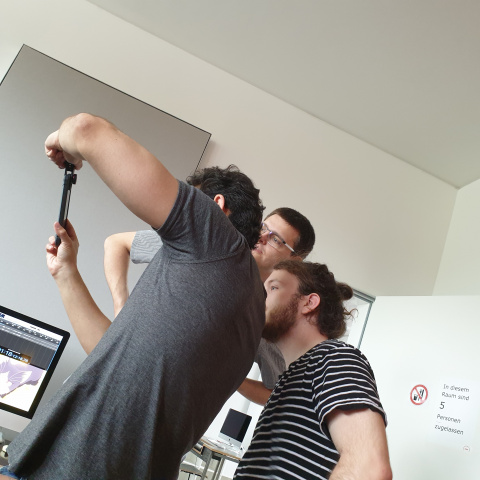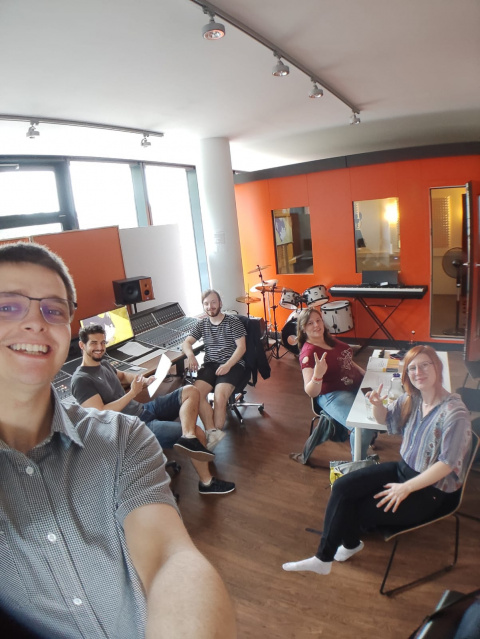
More than just voice - The 5 tools of a voice actor
What does a voice actor need? Sure - his voice. But that's not all, the profession requires a lot more. Vito Franz is a voiceover student at Deutsche POP in Bochum and is in the process of building up his own business while still a student. The sooner the better, we agree! In the current feature, you can read about the skillset you'll find in a voice actor's toolbox, and what tips Vito has for you if you're also thinking about a career in the voice business.
Tool 1 - A solid foundation: Portfolio in Progress
A good foundation starts with a good portfolio. Whether it's voice acting, audio book dubbing, or other projects, it's important to show what you've got, "even if you're not getting paid for jobs yet," Vito tells us. Recreational projects are a good exercise in getting to know the business.
In one of his latest projects, for example, the Bochum student voices a role in the popular anime My Roommate is a Cat. Together with about 15 colleagues and fellow students, he has taken on the task of dubbing the first German version of the anime for a project at POP - which does not yet exist. There are a lot of other tasks involved in such a project: "We first translated the entire series. Then, of course, we had to cast the roles appropriately. To do that, you analyze the characters and their behavior. We did the complete work of a studio." These tasks are exciting for Vito, because it gives him an insight into the daily work processes of a voice actor. "The whole thing is for practice, but when we're done with it, we'll all have something neat to show in our portfolios. With that, we can apply for real jobs." His tip: Constantly work on the portfolio, collect recording samples, organize!

Tool 2 - Emotion and Reconstruction
Voices are sought in all shapes and colors. From light to dark, from dialect to accentless - in news, commercials, video games, film dubbing, audio books...the list for potential voiceover jobs is large. But without the right emotions, even the right voice doesn't do much - because a role isn't just a voice, it's the personality behind it. "There are many ways to prepare for a role. Many of them have to do with acting," Vito explains. "I always collect info and pictures about the role first, you can already deduce a lot there. You can recognize physical centers, driving forces of the character, negative and positive emotions, and things like speech impediments, how a character walks and stands - it's all part of the big picture, so you can empathize with the role." As another exercise, Vito likes to do a kind of inner monologue as the character himself and write it down, "I completely take the character apart before I speak for him." This sounds like a lot of work, but it's worth it in retrospect, because "a lot of people think you have to be able to control your voice and disguise it when you speak so that it fits the character. But actually you have to forget your voice completely, you can't hear it at all. When you embody the character, the voice comes all by itself. Only then is it authentic." His conclusion: character analysis and constant voice training from different angles.
Tool 3 - Preparation, adaptation, flexibility
It's not only good to be prepared vocally and emotionally, you should also be familiar with the technology, recommends the POP student: "Every recording studio works differently, you should be prepared for that. Some have a teleprompter, others work with pen and paper." This, however, was initially a challenge for Vito, as the 29-year-old suffers from poor eyesight: "it boils down to the fact that I only have 20% vision in my right eye. Unfortunately, glasses don't help". This doesn't necessarily make it easy for him to read off his text, but that doesn't stop him from giving 100%. The student from Bochum knows how to help himself: "with some methods you can compensate for this when speaking - I always work with an iPad instead of text on paper. I can make the font bigger and invert the colors. The iPad goes on a movable arm, right at eye level next to my mic. That way I can work reasonably with the text," he reveals to us. And how can he see when a character is moving his lips? The voice-actor-to-be has a workaround for that, too: "Here I work with a time code. I measure the time when my character starts speaking, when it pauses, and so on. That way I know when to start. You learn over time to orient yourself to different things." Vito's tip: Stay adaptable! What's being asked of me, and what's the best way to solve it?

Tool 4 - Initiative
If you want to be successful in your career, you have to do something about it - that's nothing new. However, it is often difficult for newcomers to find their way in their new industry. Vito has a tip for this: a good network, even during your studies. It doesn't matter where you start, the main thing is to create a connection. For his current dubbing project, for example, he found a large part of his team through the Deutsche POP Discord group. Once you have a few contacts, it spreads quickly, "then there's someone who knows someone who knows someone, and so on. That's how you get your team together really quickly." So he starts projects here and there that expand the network while providing a lot of practice and experience. According to Vito, "education is what you make of it, so I'm already networking as much as I can."
The aspiring voiceover artist has also connected with studios and professionals in the industry, "Nowadays, something like this just goes on Instagram. You don't have to ask for work directly. But everyone likes to give feedback, and that opens up a conversation. You have to be able to take feedback, by the way." He also says it's never wrong to actively pursue other things in addition to training: "You have to find yourself and develop individually. Take acting lessons or singing lessons, too, that doesn't hurt." A big topic, so Vito has two tips right here: Network, Network, Network! And actively put out feelers - more practice and experience never hurts!
Tool 5 - Confidence and conviction
And what is Vito's biggest challenge as a budding, self-employed voice actor? His answer:
"You have to choose to be a voice actor again every day".
Although Vito is still a student, he has already thought a lot about the process of being an independent voice actor, and the eventual setbacks that come with it: "There will definitely be defeats at times, but you can't let that get you down. When you're self-employed, you have to take care of everything, but do what fulfills you. That's more important to me than earning a lot of money quickly with some office job." The young voice actor knows what he's talking about, because he's already had experience with a well-paid, permanent 9-5 job: "Those were good years, too. You learn a lot in a large corporation and there are very good reasons to stay there. I've been thinking about it for a long time, and I doubt every day.... Everyone doubts. Arnold Schwarzenegger still has nightmares today where his mother wakes him up and tells him it's time for his shift as a factory worker. But if you manage to keep going despite doubts, self-confidence comes out of it. You just know who you are. And that is absolutely important and necessary." Remember: If you want to get into the voiceover business professionally, be confident, stay confident, and don't let setbacks get you down!
